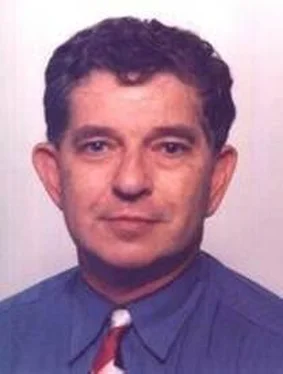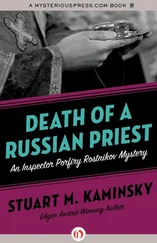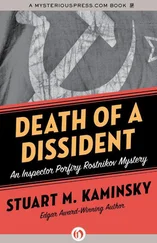Aiden scrambled down into the shaft with tweezers and a plastic bag, took three photographs, and retrieved the bullet.
HAWKES LOOKED DOWN AT COLLIER'S BODY, Mac and Stella at his side.
"The killer was taller than the victim," Hawkes said. "Look at the bruises."
He pointed to the dead man's neck.
"Pulled back and up to get leverage. Bruises start at the Adam's apple and work upwards. Like this."
Hawkes got behind Mac and demonstrated. Mac could feel Hawkes's loose grip moving upward.
"Probably lifted our victim right off the ground."
Hawkes stepped back and looked down at the corpse again.
"Dead man weighs two hundred and ten pounds and is six one and a half," Hawkes said. "Your killer is at least six five, maybe as tall as six six or even six seven and very strong. No fumbling around here, just one clean arm around the neck from behind and a powerful sudden pull. No struggle."
"And?" asked Stella.
"Killer's right-handed," said Hawkes. "Principal bruising and crushing of the esophagus is on the victim's right side."
"So if we find a left-handed giant, he's innocent?" asked Mac straight faced.
"Thus eliminating left-handed giants," Hawkes agreed.
"He's done this before," said Stella.
"He knew what he was doing," said Hawkes. "You like opera?"
"Never saw one," said Stella.
Mac had seen them. His wife had loved opera. And Mac had gotten used to the artificial, inane stories, the overacting, and the semi-pomp of dressing up. He had especially liked watching Claire dress for a big night out. She always smiled in anticipation. And Mac had gradually grown to appreciate the music and the singing.
"I've got two tickets for Don Giovanni tomorrow," Hawkes said. "Donatelli in Homicide gave them to me. He's got a cousin in the chorus. Donatelli's wife has the flu, which, he said, was one he owed God."
"You're not going?" asked Stella.
"I prefer CDs," said Hawkes. "You want to try?"
"No, thanks," said Stella.
"Mac?" asked Hawkes.
Mac considered and looked at Stella.
Her cheeks were pink, but it was difficult to tell how pink under the surgical lights. Her eyes were moist and he thought she looked a little unsteady.
"Take them," she said.
"You all right?" he asked.
"A cold," she said.
Mac held out his hand and Hawkes produced two tickets from his pocket. Mac glanced at them. They were good seats, orchestra.
"Thanks," he said, pocketing them.
On the way down the corridor, with gray frigid light coming through the windows, Stella asked, "You really like opera?"
He almost said, "We did," but stopped himself and instead said, "Depends on the opera."
In the lab, Danny Messer stood in front of a large table on which lay a two-foot length of steel chain.
"Where do we start?" he said, looking at Stella and Mac.
Mac jerked his chin at the chain.
"Right," said Danny. "Standard stuff. Some of the links have tiny numbers indicating their manufacturer. One thing's for sure. This chain matches the fragments we got in that hotel room. I called the manufacturer. They guarantee the chain will hold a hundred pounds. The woman I talked to said that holding more than a hundred pounds on the chain out the window would probably result in one or more of the links opening."
"Collier's clothes?" asked Mac.
Danny smiled and walked over to a microscope. Alongside the microscope were slides neatly numbered. Danny put one of the slides in the microscope, focused, and stepped back.
"Tested the brown-white flecks," Danny said. "Flour. On the back of his jacket only."
Stella examined the slide.
"Collier's body was moved in a vehicle containing flour," said Mac.
"Almost coated in a thin layer," said Danny.
"Insect pieces in the flour," Stella said. "In the other samples too?"
"Yep," said Danny.
"Federal Drug Administration allows a low level of insect content in flour used in bakeries," said Mac.
"I'll remember that when I order a sub for dinner tonight," said Danny.
Stella moved aside and Mac gazed into the microscope saying, "Insects are different for each bakery."
"And," added Danny, "there are different kinds of flour, different additives. I'm tracing the producer of this flour. I'll get a list of their customers. Then we can match the flour and insect particles to a particular bakery."
"Maybe," said Stella, arms folded.
"Maybe," Danny agreed.
"Start with Marco's Bakery," said Stella.
They all knew why. The fingerprint in the hotel room above Alberta Spanio's bedroom had been left by Steven Guista, a man with an arrest record, a big man who drove a truck for Marco's Bakery, which was owned by Dario Marco, the brother of the man Alberta Spanio was supposed to testify against.
"Nothing from Flack?" asked Mac.
"Nothing yet," said Danny. "He's waiting at Guista's apartment. Judge Familia issued the warrant."
Mac looked at Stella, who held back a sniffle.
"I'll get my kit," she said.
It would take them twenty minutes to get to Guista's apartment. A lot would happen in those twenty minutes.
* * *
Don Flack carefully examined Guista's small apartment, listening for footsteps in the hall. A monk could have lived there.
There was a stained green recliner in the small living room just inside the door to the hall. The stained recliner had a hollowed-out indentation where Guista probably spent most of his time. A small color Zenith television sat on top of an old three-drawer dresser directly in front of the recliner. A remote sat on the arm of the recliner.
There was a Formica-covered table in the kitchen with aluminum legs and three matching chairs with blue plastic seats and backs. A refrigerator with little in it, a cupboard with three coffee cups, four dinner plates, a pair of heavy glasses. Under the sink were one pot and one chipped Teflon-covered pan.
The bedroom was tiny. A big neatly made bed with a green blanket and four pillows took up most of the bedroom space. There were no books or magazines on the night table. On the wall at the foot of the bed was a print of three horses eating grass in a broad rolling pasture.
The small bathroom had an oversized old tub with clawed feet and old porcelain handles.
What struck Flack most about the apartment was that it appeared to be immaculately clean, almost antiseptic, barely lived in. There weren't many clothes in the drawers or closet. Guista did seem partial to green in his socks, shirts, and few pieces of furniture.
Don went back in the living room/kitchen area and sat in one of the chairs at the Formica-covered table. The chair faced the door.
Don was prepared to spend the rest of the day and all night in the small apartment.
* * *
Across the hall, Big Stevie and Lilly partied, ate, and began to watch a rerun of a Gunsmoke episode, one of the ones in black and white with Dennis Weaver as Chester.
Stevie wanted to stay there. He had done enough for one day, more than enough. He hoped it would be appreciated. He didn't expect a bonus. A small sign of appreciation would do. And it was his birthday.
But right now he had to think. There was someone in his apartment, a man, waiting for him, going through his neatly stacked clothing, his evenly spaced pants, shirts, and jackets, his coffee cups and cereal jars.
Big Stevie knew he had to get away, but it felt right sitting with Lilly, eating the last of the cake, drinking orange-tangerine juice.
It was most likely the cops. But it was too soon for them to find him. In fact, he did not expect to be found at all, but here they were.
Then another thought welled up. He tried to push it down. What if it wasn't the cops? What if Mr. Marco thought Big Stevie might get picked up, might talk? What if Mr. Marco thought Big Stevie was getting too old for the work? No, couldn't be. Wouldn't happen. But maybe.
Читать дальше












